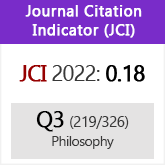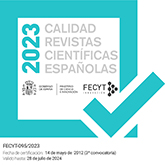Default humanity, default cooperation
DOI:
https://doi.org/10.3989/isegoria.2022.67.19Keywords:
Default positions, Default humanity, Dualism, Cooperation, Collective intentionalityAbstract
According to John Searle, default positions, i.e., those intelligibility and action presuppositions, are some departing points from which pre-reflective and pragmatic assumptions are made. Postulating such points helps us deal with certain perennial philosophical issues, by leaving them aside. These problems are the existence of the external world, truth and facts, “direct” perception, the meaning of words, and causality. In this article, we argue that those default positions described by Searle constitute a default humanity, and their absence would dehumanize us. This is particularly relevant in a default position: cooperation, which is the basis of collective intentionality and the milestone of human civilization.
Downloads
References
Bear, A., y Rand, D. G. (2016). Intuition, deliberation, and the evolution of cooperation. Proceedings of the National Academy of Sciences, USA, 113, pp. 936-941. https://doi.org/10.1073/pnas.1517780113 PMid:26755603 PMCid:PMC4743833
Bear, A., Kagan, A., y Rand, D. G. (2017). Co-evolution of cooperation and cognition: The impact of imperfect deliberation and context-sensitive intuition. Proceedings of the Royal Society B: Biological Sciences, Vol. 284, No. 1851. https://doi.org/10.1098/rspb.2016.2326 PMid:28330915 PMCid:PMC5378075
Casey, E. (1972). Freud's Theory of Reality: A Critical Account. The Review of Metaphysics, Vol. 25, No. 4, Jun., pp. 659-690.
Damasio, A. (2000). The Feeling of What Happens: Body, Emotions and the Making of Consciousness. London: Vintage.
Dawkins, R. (1976). The Selfish Gene. Oxford: OUP.
Descartes, R. (2008). Meditations on First Philosophy En: Cottingham, J., Stoothoff, R. y Murdoch, D. (eds.) The Philosophical Writings of Descartes (Vol. II, pp. 1-398). New York: Cambridge University Press.
Grice, H.P. (1991). Las intenciones y el significado del hablante. En: Valdés Villanueva (ed.) La Búsqueda del Significado. Madrid: Tecnos, pp. 481-511.
Hrdy, S. (2009). Mothers and Others: The Evolutionary Origins of Mutual Understanding. Cambridge, Mass.: Belknap.
Jaeggi, A., Burkart, J., Van Schaik, C. (2010). On the psychology of cooperation in humans and other primates: combining the natural history and experimental evidence of prosociality. Philosophical Transactions: Biological Sciences Vol. 365, No. 1553, pp. 2723-2735. https://doi.org/10.1098/rstb.2010.0118 PMid:20679115 PMCid:PMC2936168
Kirk, R. y Squires, J. E. R. (1974). Zombies versus Materialists. Aristotelian Society Supplementary Volume Vol. 48, No. 1: p. 135-164. https://doi.org/10.1093/aristoteliansupp/48.1.135
Loose, J., Menuge J. y Moreland, J. (2018). The Blackwell Companion to Substance Dualism. Oxford: Blackwell. https://doi.org/10.1002/9781119468004
Mulligan, K. y Correia, F. (2017). Facts. The Stanford Encyclopedia of Philosophy, 2017. Disponible en: https://plato.stanford.edu/archives/win2017/entries/facts/
Nagel, T. (1974). What is it like to be a bat? En: Chalmers, D. (ed.) Philosophy of Mind: Classical and Contemporary Readings. Oxford: OUP, pp. 219-226.
Nowak, M. y Highfield, R. (2011). Supercooperators: Altruism, evolution, and why we need each other to succeed.
Racokzy, F. y Tomasello, M. (2007). The Ontogeny of Social Ontology: Steps to Shared Intentionality and Status Functions. En: Tsohatzidis, S. (ed.) Institutional acts and institutional facts. Dordrecht, The Netherlands: Springer, pp. 113-138. https://doi.org/10.1007/978-1-4020-6104-2_5
Rosati, A., DiNicola, L. y Buckholts, J. (2018). Chimpanzee cooperation is fast and independent from self-control. Psychological Science Vol. 29, No. 11, 1-14. https://doi.org/10.1177/0956797618800042 PMid:30295562
Searle, J. (1983). Intentionality. Cambridge: Cambridge University Press. https://doi.org/10.1017/CBO9781139173452
Searle, J., (1990). Collective intention and actions. En: Cohen, P., Morgan, J. y Pollah, M. (eds.), Intentions in Communication. Cambridge, Mass.: MIT Press.
Searle, J. (1995). The Construction of Social Reality. New York: Basic Books.
Searle, J. (1997). The Mystery of Consciousness. London: Granta.
Searle, J. (1998). Mind, Language and Society. New York: Basic Books.
Searle, J. (2001). Rationality in Action. Cambridge, Mass.: MIT Press. https://doi.org/10.1080/10002001058538709
Searle, J. (2004). Mind: A Brief Introduction. Oxford: OUP.
Searle, J. (2007). Reductionism and the irreducibility of consciousness. En: Block, N.; Flanagan, O. y Güzeldere, G. (eds.) The Nature of Consciousness: Philosophical Debates. Cambridge, Mass., MIT Press, pp. 451-459.
Searle, J. (2010). Making the Social World: The Structure of Human Civilization. Oxford: OUP. https://doi.org/10.1093/acprof:osobl/9780195396171.001.0001
Searle, J. (2015). Seeing Things as they are: A Theory of Perception. Oxford: OUP. https://doi.org/10.1093/acprof:oso/9780199385157.001.0001
Stroud, B. (2008). The problem of the external world. En: Sosa, E., Kim, J., Fant, J. y McGrath, M. (eds.) Epistemology: An Anthology. Oxford: Blackwell, pp. 7-34.
Tomasello, M. (2009). Why We Cooperate. Cambridge, Mass.: MIT Press. https://doi.org/10.7551/mitpress/8470.001.0001
Tomasello, M. (2019). Becoming Human: A Theory of Ontogeny. Cambridge, Mass.: Harvard University Press. https://doi.org/10.4159/9780674988651
Vargas-González, Carlos y Toro-Jaramillo, Iván-Darío (2021). La libertad como el punto de encuentro para la construcción de la confianza en las relaciones humanas. Isegoría, 65: e09. https://doi.org/10.3989/isegoria.2021.65.09
Waal, F. de (2005). Our Inner Monkey. New York: Penguin Books.
Waal, F. de (2019). Mama's Last Hug: Animal and Human emotions. New York: W.W. Norton.
Williams, M. (2001). The Problems of Knowledge. Oxford: OUP.
Published
How to Cite
Issue
Section
License
Copyright (c) 2022 Consejo Superior de Investigaciones Científicas (CSIC)

This work is licensed under a Creative Commons Attribution 4.0 International License.
© CSIC. Manuscripts published in both the printed and online versions of this Journal are the property of Consejo Superior de Investigaciones Científicas, and quoting this source is a requirement for any partial or full reproduction.All contents of this electronic edition, except where otherwise noted, are distributed under a “Creative Commons Attribution 4.0 International” (CC BY 4.0) License. You may read here the basic information and the legal text of the license. The indication of the CC BY 4.0 License must be expressly stated in this way when necessary.
Self-archiving in repositories, personal webpages or similar, of any version other than the published by the Editor, is not allowed.














